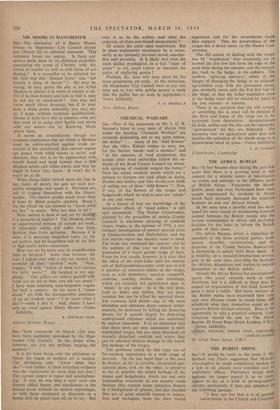MR. MOORE IN MANCHESTER SIR,—The discussion of a Henry Moore
bronze by Manchester City Council stirred you (March 12) to editorial comment. This comment leaves me uneasy. Is there any serious -harm done by an alderman puckishly associating the name of Christie with the torsos of murder as well as with those of art dealing ? Is a councillor to be pilloried for his view that this ' Draped Torso ' was " not exactly a thing of beauty " ? He may be wrong; he may ignore the aim of art styled Modern to discuss it in terms of beauty at all. Yet if he likes beauty and fails to find it, may he not say so unashamed ? One may not know much about drainage, but if to your nose a drain seems unhealthy you may say so, I hope, without technical qualifications. Drains at least have this in common with art, that most of us judge their health and worth with our senses—not by Knowing Much About them.
It seems an unsatisfactory though too common implication that art which is Modern must be cotton-woolled against crude re- actions of the uninitiated; that current vogues are gospel truth while beauty is staled and obsolete; that Art is to be approached with breath bated and head bowed; that a few Modern artists and critics know, and that we bught to know they know. it won't do; it won't do at all.
When Dame Edith Sitwell takes this line in her. realm of poetry she gets no such pro- tective wrapping—nor needs it. Novelists are left to content themselves with the library verdict. The theatre profits much more than it loses by direct popular reaction. Music? On the whole we are allowed to "know what we like " in music. Why not then in art 7 What service is done to any art by making it a preserve of experts ? The Modern, novel or experimental portion of current art work, if inherently viable, will suffer less from derision than from seclusion. Because it is news it is naturally magnified today by the art writers; but its magnifiers will be the first to fI9d newer news—tomorrow. How can we be more sure in magnification
than in derision ? Some time between the wars I talked over with a city art curator his roomful of then modern' work. " Now, frankly," I said, " which of these will survive for thirty years ?" He laughed at my sim- plicity. " Our cellars are closely packed with work not as old as that; you ask too much." I have been watching soon-forgotten vogues for half a century. In my teens I. " knew about" art with the incomparable assurance of an art student: now—" I do know what 1 like "—while I like it. And, please. I have said no word against Henry Moore.—Yours R. KINGSLEY READ
Abbots Morton, Worcs










































 Previous page
Previous page